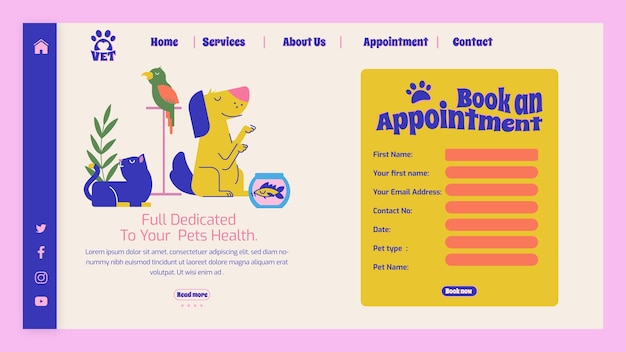Pet Nutrition Essentials for Wellness in Northlake, TX


Pet Nutrition Essentials for Wellness in Northlake, TX
Proper nutrition is at the heart of your pet’s health, no matter their age or breed. If you’re a pet owner in Northlake, TX or nearby communities, you might wonder how to make the best choices for your dog or cat’s diet. Are you feeding the right food? Should you be concerned about your pet’s weight or appetite? At Canyon Falls Veterinary Hospital, our team of veterinarians is committed to helping you navigate these questions with confidence and care.
In this blog, you’ll discover how pet nutrition in Northlake, TX supports your companion’s overall wellness. We’ll walk through the signs of poor nutrition, explore what goes into a healthy diet, and offer advice on portion control and weight management. You’ll also learn when it’s time to seek professional guidance, ensuring your pet receives the highest standard of care from a trusted veterinarian near me. If you’re interested in learning more about preventive care as part of your pet’s wellness journey, consider scheduling a wellness and preventive care exam at our warm, modern clinic located at 7251 Canyon Falls Dr, Suite 201, Northlake, TX 76226.
Recognizing Signs of Poor Pet Nutrition
Pet owners often notice subtle changes before realizing their cat or dog’s nutrition needs may not be fully met. Nutrition-related problems can manifest in a variety of ways, and early recognition is essential to prevent more serious health issues. Some of the most common signs that may indicate a problem include a dull or flaky coat, excessive shedding, persistent itching, or skin inflammation. Other symptoms to watch for are frequent digestive upsets such as vomiting, loose stools, or constipation, as well as a sudden change in appetite or energy levels. If your pet seems lethargic, is losing or gaining weight unexpectedly, or you notice changes in their stool consistency, these may all be linked to nutritional deficiencies or imbalances.
Dental health can also offer clues, since poor nutrition often contributes to bad breath, tartar buildup, and gum issues. Pets with weakened immune systems may experience frequent infections or take longer to recover from minor illnesses. In growing puppies and kittens, stunted growth or orthopedic issues might signal a dietary problem. Addressing these issues early with the support of a veterinary team can help your pet regain their health and vitality.
Why Nutrition Matters: The Science Behind Pet Diets
Understanding the role of nutrition in your pet’s health begins with appreciating how diet fuels every aspect of their body. A balanced diet provides the essential nutrients—proteins, fats, carbohydrates, vitamins, minerals, and water—that support everything from muscle maintenance to immune function. Each species and life stage has specific requirements; for example, kittens and puppies need more protein and fat for growth, while adult and senior pets benefit from diets tailored to maintain lean muscle and promote joint health.
Several factors can contribute to nutritional imbalances or deficiencies. Feeding a diet formulated for a different species, such as giving dog food to cats, can lead to serious health consequences. Homemade diets, if not properly balanced, may lack key nutrients. Feeding excessive treats or table scraps can contribute to obesity and disrupt the nutritional balance of commercial diets. In some cases, underlying medical conditions such as food allergies, gastrointestinal disorders, or metabolic diseases can impact nutrient absorption and utilization.
The Northlake, TX climate and lifestyle also influence your pet’s needs. Active dogs exploring local parks may require more calories, while those spending hot summers indoors may need fewer. The best approach is to tailor nutrition to your pet’s individual needs, which is where healthy pet food advice from your veterinary professionals makes all the difference.
Creating a Healthy Diet: Choosing Food and Managing Portions
Selecting the right food is the foundation of pet nutrition in Northlake, TX, especially with so many choices available in stores and online. The process can feel overwhelming for any pet owner, but there are some guiding principles that can help you make informed decisions. Look for commercial pet foods labeled as “complete and balanced,” which indicates they meet standards set by the Association of American Feed Control Officials (AAFCO). These diets are formulated to deliver the full spectrum of nutrients your pet needs.
For pets with specific health concerns, prescription or veterinary diets may be recommended. These are designed to address issues such as allergies, kidney disease, urinary tract health, or weight management. If you’re unsure which option is right for your dog or cat, our veterinary team can provide personalized healthy pet food advice during your next visit.
Portion control is equally important. Overfeeding is a leading cause of obesity, which increases the risk of diabetes, arthritis, and heart disease. Feeding guidelines on pet food packages are a helpful starting point, but individual needs vary based on age, activity level, and metabolism. Measuring your pet’s food accurately and avoiding free-feeding can help prevent excess weight gain. For those who prefer the convenience of online ordering, Canyon Falls Veterinary Hospital offers an online pharmacy for pet medications and nutrition products, making it easier to access veterinarian-recommended diets for ongoing wellness.
If you notice your pet begging for food between meals, consider offering healthy, low-calorie treats in moderation. Vegetables such as carrots and green beans can serve as safe snacks for many dogs, while cats may enjoy freeze-dried protein treats. However, always introduce new foods gradually and consult your veterinarian before making significant changes to your pet’s diet.
Special Considerations: Age, Breed, and Lifestyle
Your pet’s nutritional needs change throughout their life. Puppies and kittens require more frequent meals and higher levels of certain nutrients to support rapid growth. As they mature, transitioning to an adult formula helps maintain an ideal body condition. Senior pets may benefit from diets lower in calories and higher in joint-supporting nutrients such as omega-3 fatty acids and glucosamine.
Breed-specific considerations also play a role. Large-breed dogs, for example, need formulas that promote slow, steady growth to minimize joint stress. Small-breed pets often have faster metabolisms and may require more calorie-dense diets in smaller portions. Lifestyle factors such as activity level, reproductive status, and medical history can further influence dietary recommendations.
Preventing Nutritional Problems at Home
Proactive home care can make a dramatic difference in your pet’s health. Steps to support your pet’s dietary wellness include sticking to a consistent feeding routine, monitoring your pet’s weight regularly, and adjusting food amounts as needed. Observing your pet’s body condition—looking for a visible waist, easily felt ribs, and a tucked abdomen—can help you identify early signs of weight gain or loss.
Limiting treats to no more than ten percent of daily caloric intake is recommended, as is resisting the urge to share table scraps. Human foods, especially those high in fat, salt, or containing toxic ingredients like onions, garlic, or chocolate, can be harmful to pets. Ensuring access to fresh, clean water at all times is another simple but vital aspect of home care.
If you have questions about transitioning your pet to a new diet, introducing supplements, or managing a multi-pet household with different dietary needs, the veterinary professionals at Canyon Falls Veterinary Hospital are available to help. Ongoing education and open communication lay the groundwork for long-term pet wellness.
When to Seek Veterinary Guidance for Pet Nutrition in Northlake, TX
Even with careful attention to diet at home, there are times when professional input is essential. You should schedule an appointment if your pet experiences unexplained weight changes, persistent gastrointestinal symptoms, chronic skin or coat issues, or a noticeable decline in energy. Pets diagnosed with chronic medical conditions, such as diabetes, kidney disease, or food allergies, also benefit from close dietary management under a veterinarian’s supervision.
Regular wellness exams include nutritional assessments, allowing your veterinarian to screen for early signs of dietary imbalance and provide tailored recommendations. These checkups are also an opportunity to discuss any new foods or supplements you’re considering.
If you’re searching for a “vet near me” who can provide expert advice on pet nutrition Northlake TX, our team at Canyon Falls Veterinary Hospital is ready to assist. Early intervention and individualized guidance are the best ways to support your pet’s longevity and quality of life.
The Role of Preventive Care and Professional Support
Preventive care is the cornerstone of lifelong wellness. Scheduling routine checkups with your local veterinarian ensures that any nutrition-related issues are identified and addressed promptly. As part of our commitment to quality veterinary services near me, our team offers comprehensive pet exams, dietary counseling, and advanced diagnostic capabilities such as laboratory testing to uncover hidden health problems that may be linked to nutrition.
If you are concerned about your pet’s weight or have questions about specific dietary needs, don’t hesitate to reach out. Our veterinary team at Canyon Falls Veterinary Hospital serves Northlake and surrounding communities with personalized, compassionate care. We are here to help you make the best choices for your pet, whether that involves selecting new foods, managing chronic conditions, or simply maintaining a healthy lifestyle.
For those interested in learning more about the connection between nutrition, dental health, and disease prevention, ask about our professional dental care services for pets during your next visit. Oral health and nutrition are often closely linked, and addressing both together can lead to even better outcomes.
Your Next Steps: Partnering for Pet Wellness in Northlake, TX
Your pet’s nutrition is one of the most important ways you can support their day-to-day happiness and long-term health. By watching for early warning signs, choosing the right food, and partnering with your local veterinary professionals, you set the foundation for a vibrant, energetic life for your furry companion. Remember, healthy pet food advice is always available from our team.
If you’re ready to take the next step, schedule a wellness examination or nutrition consultation at Canyon Falls Veterinary Hospital. Our veterinarians are here to answer your questions and develop a plan tailored to your pet’s unique needs. Contact us at (972) 559-9500 or visit us at 7251 Canyon Falls Dr, Suite 201, Northlake, TX 76226 to experience the difference that a caring, knowledgeable “vet near me” can make.
For additional resources or to order veterinarian-recommended diets, explore our online pharmacy for pet medications and nutrition products. Together, we can help your pet thrive through every stage of life with the best pet nutrition in Northlake, TX.
This blog provides general information and is not a substitute for professional veterinary advice. Always consult your veterinarian for specific recommendations regarding your pet's diet or medical needs.





















